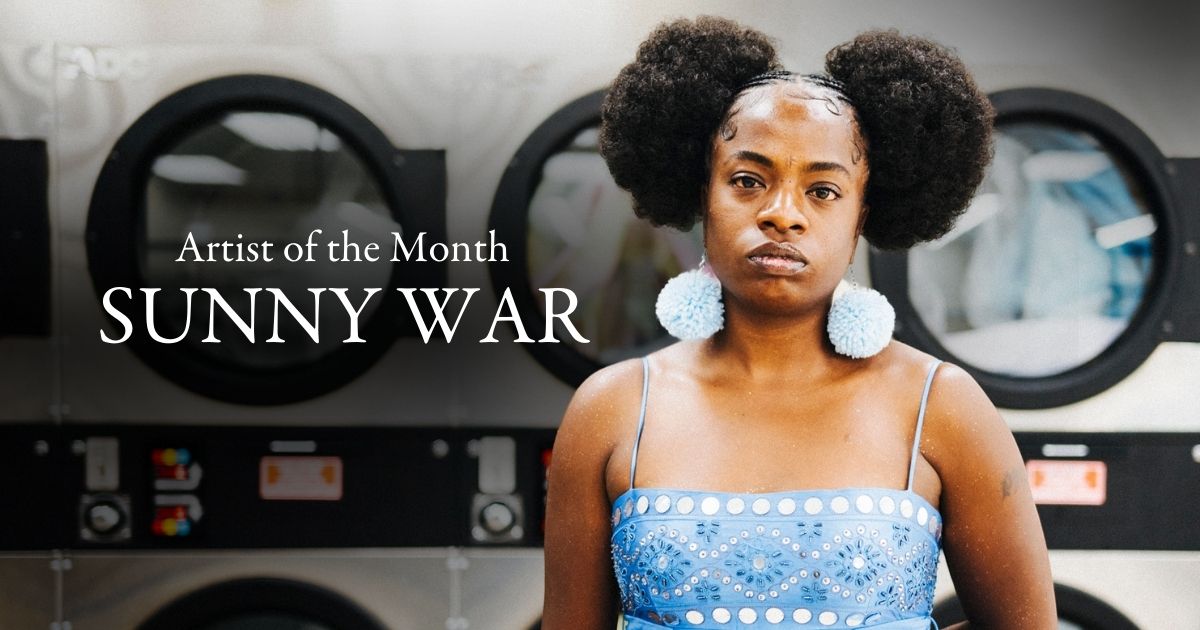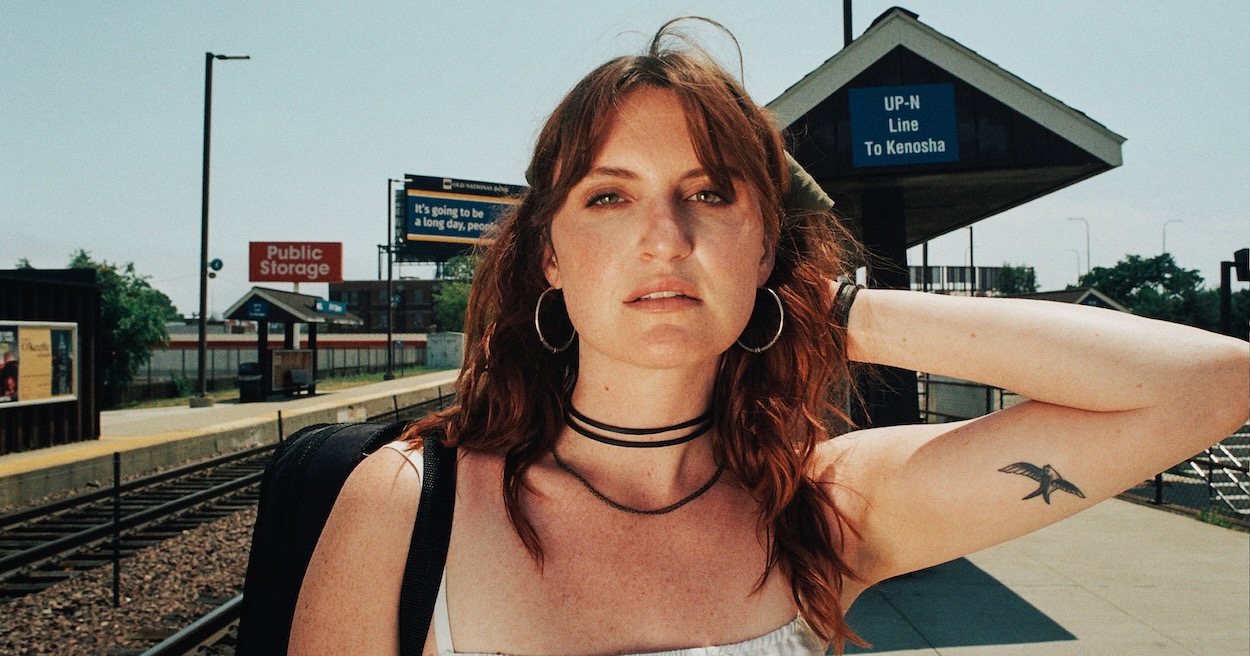In 2022, punk-blues innovator Sunny War moved into her late father’s house in Chattanooga, Tennessee, and began making repairs. There was no heat that first winter and the house needed a full electrical rewiring. By winter 2023, she had the money to heat the place, but as the temperature rose each night, Sunny felt a strange impulse to patrol the house in the dark, swinging her grandfather’s machete at the ghosts inhabiting the top floor.
At the start of our Zoom call interview in January, Sunny recounts the bizarre magical realism of the weeks she spent living with an undiscovered gas leak. I ask enough follow-up questions to be reassured that my friend is not still being fumigated in her own home before I allow myself to belly laugh. “I have to fix everything,” she sighs.
Sunny goes on to explain that by the time the city discovered and fixed the problem, the mood had already been set for her forthcoming album, Armageddon in a Summer Dress. I would describe the results as psychedelic and subtly dangerous.
My friend Sunny can be a little hard to read, a fact which she mentions at one point during our call. We first met at Americanafest in 2019. It was my second year traveling from New York to Tennessee for the annual roots music conference and festival. That summer I had made up my mind to bring Black artists together during the festival for our own unofficial day party. I booked Dee’s Country Cocktail Lounge, cross-referenced names on the festival poster with Google image searches, and sent out a few invitations. Sunny agreed to perform, as did Tré Burt and Milwaukee folk duo Nickel & Rose (featuring Carl Nichols, the artist soon to become Buffalo Nichols). One after another we played our songs then stepped out onto the Madison, Tennessee, porch, most of us meeting for the first time. It was the greatest number of Black people I had ever been around in a professional space since releasing my debut album in 2017.
It was clear to me even then that Sunny was a star. Carl, Tré, and I were on ascendant career arcs of our own, but Sunny was out ahead somehow. She was already well known in songwriter circles for her inimitable movements on the guitar and for her punk rock roots, but it was the intensity of her stage presence that stood out to me most on that first meeting. I watched her suck in the air and light around her as she sang, quietly commanding the audience’s attention. Songs like “Drugs Are Bad” and “Shell” became spells when sung in War’s almost-effortless, warmly breathy style. She appeared peaceful in her own creative world amidst the restless energy of the festival.
2019 was also the year that Sunny founded the downtown Los Angeles chapter of Food Not Bombs, a national network of community groups addressing hunger. In interviews about the movement she was candid about having experienced houselessness herself and how she noticed the disproportionate presence of veterans on the street. She organized weekly meetups in which volunteers made meals and shared them, potluck-style, with their unhoused neighbors on skid row. When COVID hit they switched to burritos and sack lunches. On “Deployed and Destroyed,” one of the outstanding tracks from Sunny’s 2021 album, Simple Syrup, she invites her listener to spend three minutes and 54 seconds in the shoes of a 26-year-old unhoused veteran experiencing PTSD. When I listen to her sing “I still love you/ We’re still friends” I feel like I am sitting beside her. This is what Aristotle and contemporary Marxists call “praxis.”
Sunny is fearless on stage. Six years into our friendship I remain awed by the way in which she commands attention without ever seeming contained by it. Her presence has a kinetic power that you can more easily get lost in than describe. We met up in Chicago on a winter night in early 2023 when Sunny was on tour and I was in between tours. Both of us were depressed, I think. Wide, wet snowflakes were beginning to fall outside while we caught up over drinks. We bribed the DJ into letting us jump the line for karaoke and then launched into a formally unconventional performance of Destiny’s Child’s “Jumpin’ Jumpin’.” The mostly-white crowd of beer-drinking twenty-somethings were amused at first and then bored. I gave up. Sunny stayed the course, winning the audience over with mischief in her eyes.
Later that year Sunny released Anarchist Gospel on New West Records to well-deserved, unanimous acclaim. The album featured Americana heavy hitters Allison Russell, Dave Rawlings, and Chris Pierce. She also toured with Mitski, broadening her fandom to include more indie listeners. I cheered my friend from afar, mostly on Instagram, as her star continued to rise.
When I ask about her memories of that album cycle, Sunny enthusiastically recalls the younger audiences who discovered her music. She expresses gratitude that a 14-year-old at a Mitski concert, someone who “actually is into music for the first time in their life, in the way that you are when you hate your parents and all you have is music” would become a fan. A lot of journalists described her as an “emerging” artist or a songwriter soon to be one of the most beloved in Americana. But for those of us on the fringes of the format, Sunny had been the best around for a minute and the momentum of her career spoke for itself.
Sunny’s latest album, Armageddon In A Summer Dress, comes out on February 21. I ask her to describe the new record in her own words. “Silly,” she responds. I ask if there is a genre descriptor for her music in general. She says, “No.” I am going to follow the artist’s lead and not do her album the disservice of describing it too much. I will say that Armageddon In A Summer Dress is her seventh full-length effort and contains her most inspired vocal performances yet – and some of her finest lyrics.
There is a haze hovering in the top layers of some of these tunes. The winding guitar melodies often weave themselves into the vocal lines, but sometimes they go their own way. I ask her if audiences are reacting to the Black anarchist content of her songs differently than they did the last time she released a folk album with transparently leftist politics. “I don’t feel like people pay that much attention to my lyrics,” she responds. Her primary musical concern, she reflects, is playing the guitar. And in any case, the best way to metabolize these songs is by listening to them repeatedly.
Sunny, Carl, Tré, and I have remained loosely intertwined in the years since that first Americana kickback. We have toured together. We run into each other at festivals and in thrift shops. Tré and Sunny were roommates for a time and in the summertime can be seen riding bikes like cousins in Sunny’s recent music video for “Scornful Heart.” I interview my friends periodically.
We all continue to embody aspects of the blues tradition while resisting categorization. Sunny continues moving patiently through her own cycles of living, transforming, creating in darkness, and then telling the story. She leaps unexpectedly from now to the future and then doubles back to sample tradition, inviting you to keep up. Her lyrics are disarmingly empathetic. Like all great artists, Sunny moves in her own time, less concerned with debating the canon than she is with creating the future. She looks back on the nights she hunted ghosts with her grandfather’s machete joking, “That wasn’t me!”
There is great integrity in Sunny’s storytelling, which means that no matter how long it has been since we last spoke, she will catch me up quickly when we meet again. I ask her who the narrator of “No One Calls Me Baby” is, trying to signal that I am a feminist who recognizes women writers as authors beyond the world of autobiography. But she quickly tells me that the narrator is her and fills me in on the past few months of her life. She has been single for over a year, and has been learning to enjoy the alone time in a house she owns. We commiserate about being single, but we are both leaned back by this point, looking down on loneliness together. “No one calls me baby anymore/ I hold my own hand now…”
One of my favorite things about Sunny is that whether she’s playing a dive bar or a sold-out theater, everyone walks away dazzled. She is just as warm and entertaining sitting across from you in her home. She accompanies herself.
Find more Sunny War Artist of the Month coverage here.
Photo Credit: Joshua Black Wilkins

